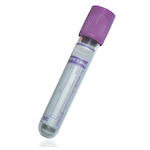Sickle Screen (Haemoglobin S)
Specimen Volume
4mLSpecimen Transport
Standard transport to laboratorySample Preparation
Turnaround Time
4 hours from receipt if urgentSample Stability
4 Days, providing storage at 2-8°CGeneral Information
Samples that meet the following criteria will not be processed:
- Samples from patients who have recently been transfused, as these may give erroneous results. Testing should be performed at least 4 months post-transfusion.
- Samples which fail the minimum data set.
Assay Limitations:
- False positives may occur in patients with erythrocytosis, hyperglobulinemia, extreme leukocytosis or hyperlipidimeia. Coarse flocculation may occur in these samples, due to elevated levels of total serum protein. These patients samples may be washed in normal physiological saline, centrifuged and 10µl of the packed cells used for testing.
- The Sickle Screen test is only sensitive to sickle cell levels above 15%. This is adequate to detect both sickle cell carriers and patients who are compound heterozygous provided they have not received a recent transfusion.
- False positive or false negatives can occur in patients with severe anaemia (≤15 haematocrit). In cases of severe anaemia the blood sample should be centrifuged to sediment the red cells and excess plasma pipetted off to give a haematocrit of 50%.
- False negatives may occur in infants under 6 months of age due to elevated levels of HbF.
- Positive results may occur in patients with some rare sickling haemoglobin subtypes such as Haemoglobin C Harlem and Haemoglobin C Georgetown.
- False positives or false negatives may occur in patients with a recent blood transfusion.
- Sickledex is a qualitative screening procedure and does not differentiate between sickle cell disease (SS) or sickle cell trait (AS). All positive results should be further evaluated by HPLC and electrophoresis.
For more information please see https://labtestsonline.org.uk/tests/sickle-cell-test
Notes
Please note;
- samples should be delivered to Specimen Reception at the earliest opportunity.
- clotted samples can not be processed.
Samples from patients who have recently been transfused should not be tested as these may give erroneous results. Testing should be performed at least 4 months post-transfusion.
Sickle screens are performed on urgent sickle requests including pre-operative patients due for surgery within 48hrs. Routine sickle requests and samples from GP's are sent directly for analysis to the Haematology Laboratory at Heartlands Hospital. Sickle positive results by HPLC are then sickle cell screened by this method as confirmation of Sickle cell status.
Specifications
- EQA Status: NEQAS
- EQAS Scheme: Yes








